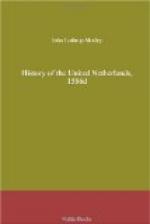Title: History of the United Netherlands, 1586
Author: John Lothrop Motley
Release Date: January, 2004 [EBook #4849] [Yes, we are more than one year ahead of schedule] [This file was first posted on April 5, 2002]
Edition: 10
Language: English
Character set encoding: ASCII
*** Start of the project gutenberg EBOOK history United Netherlands, 1586 ***
This eBook was produced by David Widger widger@cecomet.net
[Note: There is a short list of bookmarks, or pointers, at the end of the file for those who may wish to sample the author’s ideas before making an entire meal of them. D.W.]
HISTORY OF THE UNITED NETHERLANDS From the Death of William the Silent to the Twelve Year’s Truce—1609
By John Lothrop Motley
MOTLEY’S HISTORY OF THE NETHERLANDS, Project Gutenberg Edition, Vol. 49
History of the United Netherlands, 1586
CHAPTER X.
Should Elizabeth accept the Sovereignty?—The Effects of her Anger— Quarrels between the Earl and the Staten—The Earl’s three Counsellors—Leicester’s Finance—Chamber—Discontent of the Mercantile Classes—Paul Buys and the Opposition—Been Insight of Paul Buys—Truchsess becomes a Spy upon him—Intrigues of Buys with Denmark—His Imprisonment—The Earl’s Unpopularity—His Quarrels with the States—And with the Norrises—His Counsellors Wilkes and Clerke—Letter from the Queen to Leicester—A Supper Party at Hohenlo’s—A drunken Quarrel—Hohenlo’s Assault upon Edward Norris— Ill Effects of the Riot.
The brief period of sunshine had been swiftly followed by storms. The Governor Absolute had, from the outset, been placed in a false position. Before he came to the Netherlands the Queen had refused the sovereignty. Perhaps it was wise in her to decline so magnificent an offer; yet certainly her acceptance would have been perfectly honourable. The constituted authorities of the Provinces formally made the proposition. There is no doubt whatever that the whole population ardently desired to become her subjects. So far as the Netherlands were concerned, then, she would have been fully justified in extending her sceptre over a free people, who, under no compulsion and without any, diplomatic chicane, had selected her for their hereditary chief. So far as regarded England, the annexation to that country of a continental cluster of states, inhabited by a race closely allied to it by blood, religion, and the instinct for political freedom, seemed, on the whole, desirable.




